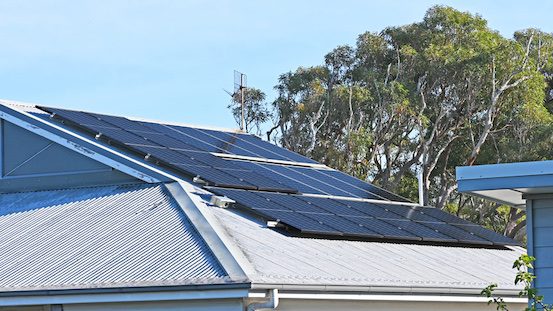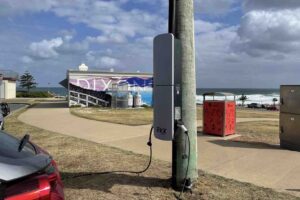Solar panels, efficient lighting and insulation are among the most wanted energy-saving devices for property buyers and renters, according to a new study, but price and a lack of knowledge is holding back investments.
The report from PropTrack and Origin Energy, released on Friday, also found most of Australia’s builders, buyers and renters considered a home’s energy rating important, and buyers were willing to pay more for a home with solar panels or a battery installed.
The results come after two years of climbing energy costs in Australia, with the price of electricity rising by 6.9 per cent during the last three months of 2023.
The Australian Home Energy Report, based on a survey of 4500 people and data from 1500 Origin Energy customers, asked participants for their views on renewable energy technology and efficient home upgrades.
It found 77 per cent of buyers and 72 per cent of renters considered a home’s energy rating important, with respondents in Tasmania and Victoria the most concerned about energy savings.
Solar panels were the most popular energy-efficient additions for both home renters and buyers, according to the report, but buyers also valued insulation and a home’s position highly, while renters preferred efficient lighting and air flow.
The report also found almost three in four participants would be willing to pay more for a home with solar panels installed, with one in 10 willing to pay five per cent or more for the renewable energy equipment.
Home batteries also added value for most respondents (61 per cent), though more than half said they would not be willing to pay more for an all-electric residence or a home with an electric car charger installed.
PropTrack senior analyst Karen Dellow said the report showed energy-efficient features were becoming an increasingly popular way to invest in homes and to limit costs.
“With home prices and median rents growing across the country, adopting energy-efficient features could help Australians reduce their bills amidst an ongoing cost-of-living crisis,” she said.
“It is important we understand what is motivating households and holding them back from certain energy-efficient features to ensure they are accessible to as many as possible.”
Despite interest in transitioning homes to run on electricity alone, only eight per cent of respondents said they were considering this move in the next year.
Almost half cited cost as their main reason for not going all-electric, though renters said their options were limited, and one in five respondents said they did not have enough information about the move.
Origin Energy retail executive general manager Jon Briskin said identifying the hurdles to making homes more efficient was vital to helping more people manage energy costs.
“We can see growing interest in smarter and cleaner energy solutions,” he said.
“The energy industry has an important role to play in making sure no one is left behind.”
Almost one in three households, or more than 3.6 million homes, are estimated to have solar panels installed, making Australia a world leader in solar energy.
Data firm SunWiz found solar capacity rose by 14 per cent in 2023, although fell short of the record rise recorded in 2021.
AAP








